Social Responsibility of Business: Theories and Examples
VerifiedAdded on 2023/01/06
|9
|2681
|21
Essay
AI Summary
This essay critically discusses the statement, "The social responsibility of business is to increase its profits," attributed to Milton Friedman, exploring the implications of this perspective. It delves into contrasting theories, such as stakeholder theory, which emphasizes the importance of considering the interests of all stakeholders, including employees, customers, and the community, not just shareholders. The essay examines the four categories of social responsibility: economic, philanthropic, legal, and ethical, and provides an extended example of socially responsible behavior in the mining industry in Canada. The essay explores the benefits of CSR, such as enhanced brand reputation and improved employee morale, while also addressing criticisms of the concept. The conclusion synthesizes these viewpoints, highlighting the complex relationship between profit maximization and social responsibility and suggesting that a balanced approach is essential for long-term business success.

Module :Social Responsibility of Business
Paraphrase This Document
Need a fresh take? Get an instant paraphrase of this document with our AI Paraphraser

Contents
INTRODUCTION...........................................................................................................................................3
The social responsibility of business is to increase its profits” (Friedman, 1970). Critically discuss this
statement using contrasting theories and an extended example that illustrates Socially Responsible
behaviour....................................................................................................................................................3
CONCLUSION...............................................................................................................................................7
REFERENCES................................................................................................................................................8
INTRODUCTION...........................................................................................................................................3
The social responsibility of business is to increase its profits” (Friedman, 1970). Critically discuss this
statement using contrasting theories and an extended example that illustrates Socially Responsible
behaviour....................................................................................................................................................3
CONCLUSION...............................................................................................................................................7
REFERENCES................................................................................................................................................8
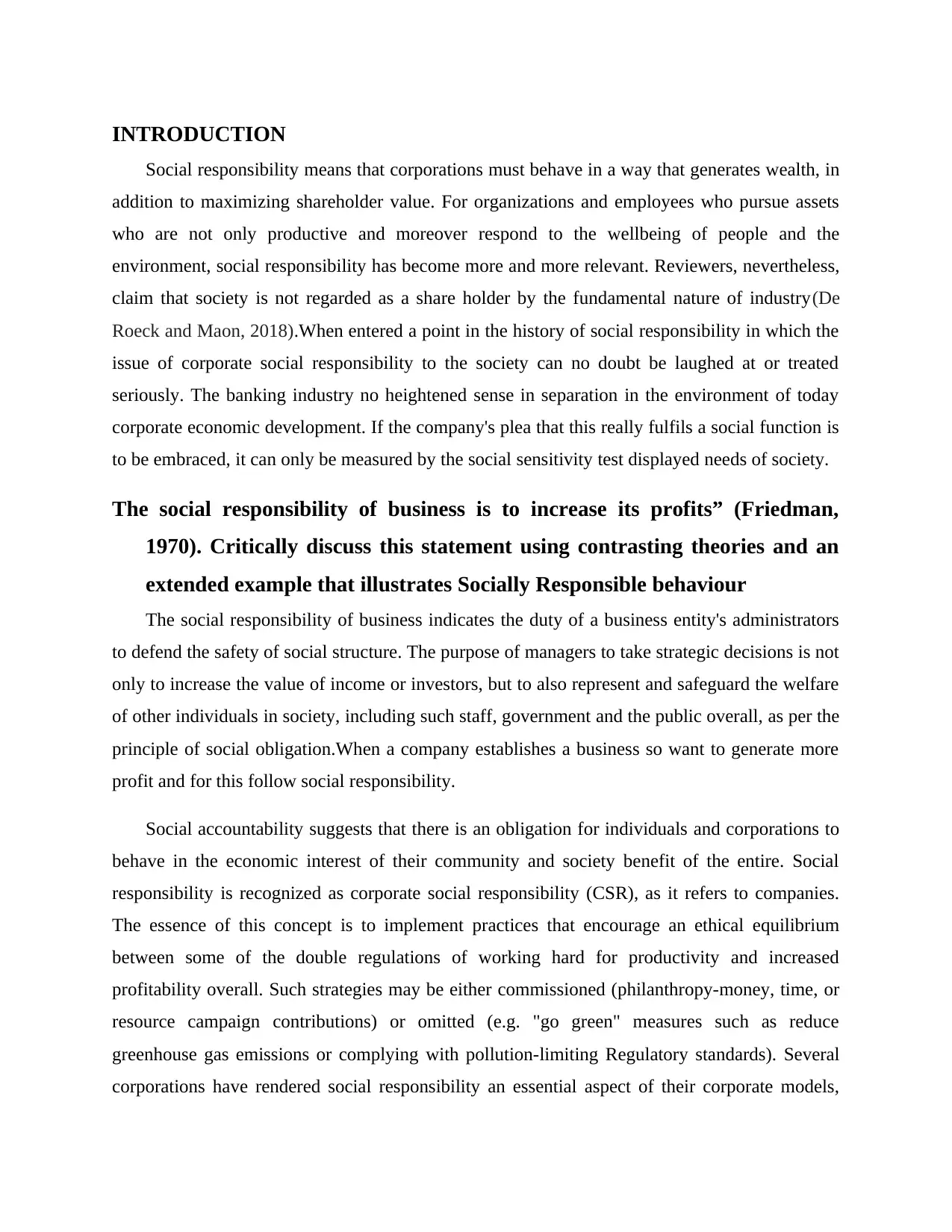
INTRODUCTION
Social responsibility means that corporations must behave in a way that generates wealth, in
addition to maximizing shareholder value. For organizations and employees who pursue assets
who are not only productive and moreover respond to the wellbeing of people and the
environment, social responsibility has become more and more relevant. Reviewers, nevertheless,
claim that society is not regarded as a share holder by the fundamental nature of industry(De
Roeck and Maon, 2018).When entered a point in the history of social responsibility in which the
issue of corporate social responsibility to the society can no doubt be laughed at or treated
seriously. The banking industry no heightened sense in separation in the environment of today
corporate economic development. If the company's plea that this really fulfils a social function is
to be embraced, it can only be measured by the social sensitivity test displayed needs of society.
The social responsibility of business is to increase its profits” (Friedman,
1970). Critically discuss this statement using contrasting theories and an
extended example that illustrates Socially Responsible behaviour
The social responsibility of business indicates the duty of a business entity's administrators
to defend the safety of social structure. The purpose of managers to take strategic decisions is not
only to increase the value of income or investors, but to also represent and safeguard the welfare
of other individuals in society, including such staff, government and the public overall, as per the
principle of social obligation.When a company establishes a business so want to generate more
profit and for this follow social responsibility.
Social accountability suggests that there is an obligation for individuals and corporations to
behave in the economic interest of their community and society benefit of the entire. Social
responsibility is recognized as corporate social responsibility (CSR), as it refers to companies.
The essence of this concept is to implement practices that encourage an ethical equilibrium
between some of the double regulations of working hard for productivity and increased
profitability overall. Such strategies may be either commissioned (philanthropy-money, time, or
resource campaign contributions) or omitted (e.g. "go green" measures such as reduce
greenhouse gas emissions or complying with pollution-limiting Regulatory standards). Several
corporations have rendered social responsibility an essential aspect of their corporate models,
Social responsibility means that corporations must behave in a way that generates wealth, in
addition to maximizing shareholder value. For organizations and employees who pursue assets
who are not only productive and moreover respond to the wellbeing of people and the
environment, social responsibility has become more and more relevant. Reviewers, nevertheless,
claim that society is not regarded as a share holder by the fundamental nature of industry(De
Roeck and Maon, 2018).When entered a point in the history of social responsibility in which the
issue of corporate social responsibility to the society can no doubt be laughed at or treated
seriously. The banking industry no heightened sense in separation in the environment of today
corporate economic development. If the company's plea that this really fulfils a social function is
to be embraced, it can only be measured by the social sensitivity test displayed needs of society.
The social responsibility of business is to increase its profits” (Friedman,
1970). Critically discuss this statement using contrasting theories and an
extended example that illustrates Socially Responsible behaviour
The social responsibility of business indicates the duty of a business entity's administrators
to defend the safety of social structure. The purpose of managers to take strategic decisions is not
only to increase the value of income or investors, but to also represent and safeguard the welfare
of other individuals in society, including such staff, government and the public overall, as per the
principle of social obligation.When a company establishes a business so want to generate more
profit and for this follow social responsibility.
Social accountability suggests that there is an obligation for individuals and corporations to
behave in the economic interest of their community and society benefit of the entire. Social
responsibility is recognized as corporate social responsibility (CSR), as it refers to companies.
The essence of this concept is to implement practices that encourage an ethical equilibrium
between some of the double regulations of working hard for productivity and increased
profitability overall. Such strategies may be either commissioned (philanthropy-money, time, or
resource campaign contributions) or omitted (e.g. "go green" measures such as reduce
greenhouse gas emissions or complying with pollution-limiting Regulatory standards). Several
corporations have rendered social responsibility an essential aspect of their corporate models,
⊘ This is a preview!⊘
Do you want full access?
Subscribe today to unlock all pages.

Trusted by 1+ million students worldwide
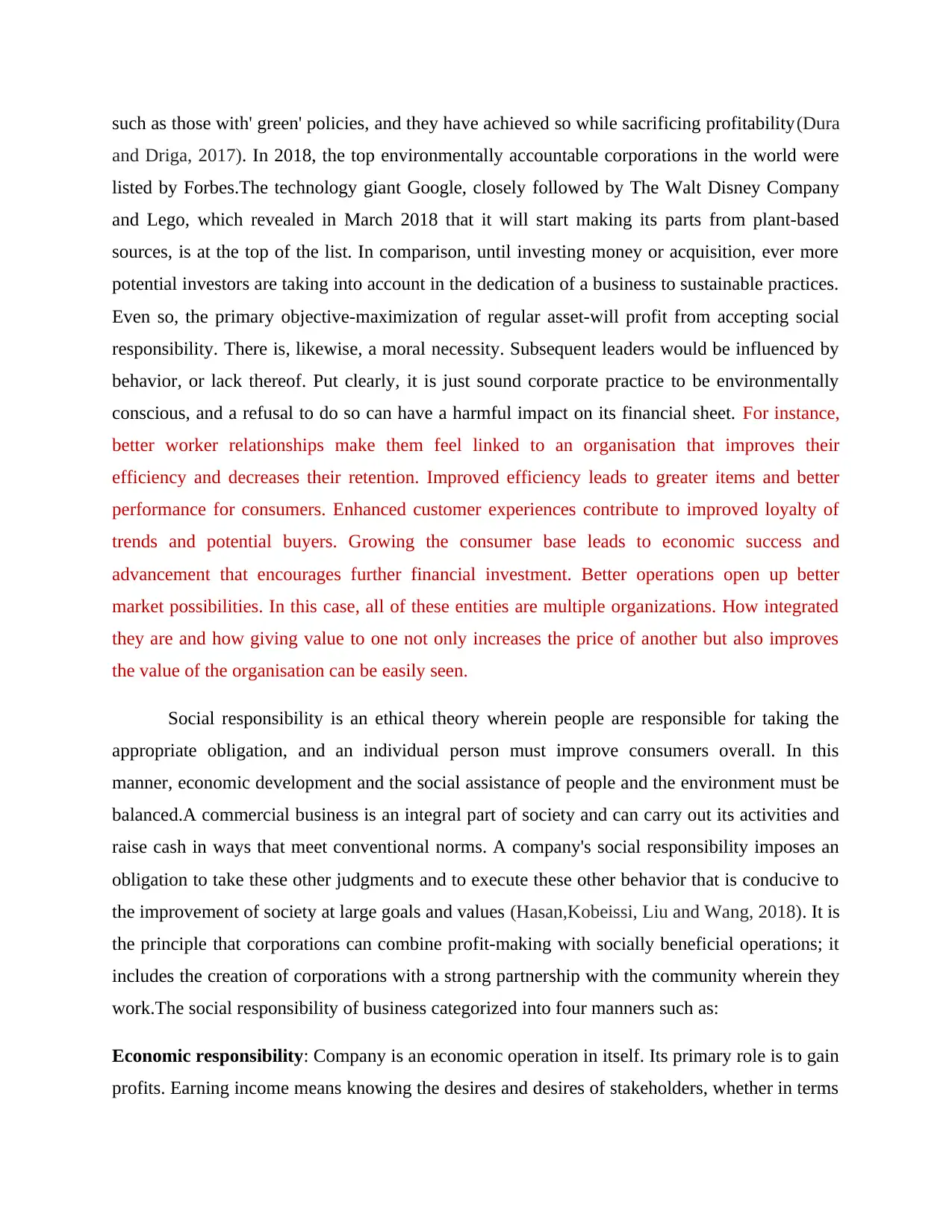
such as those with' green' policies, and they have achieved so while sacrificing profitability(Dura
and Driga, 2017). In 2018, the top environmentally accountable corporations in the world were
listed by Forbes.The technology giant Google, closely followed by The Walt Disney Company
and Lego, which revealed in March 2018 that it will start making its parts from plant-based
sources, is at the top of the list. In comparison, until investing money or acquisition, ever more
potential investors are taking into account in the dedication of a business to sustainable practices.
Even so, the primary objective-maximization of regular asset-will profit from accepting social
responsibility. There is, likewise, a moral necessity. Subsequent leaders would be influenced by
behavior, or lack thereof. Put clearly, it is just sound corporate practice to be environmentally
conscious, and a refusal to do so can have a harmful impact on its financial sheet. For instance,
better worker relationships make them feel linked to an organisation that improves their
efficiency and decreases their retention. Improved efficiency leads to greater items and better
performance for consumers. Enhanced customer experiences contribute to improved loyalty of
trends and potential buyers. Growing the consumer base leads to economic success and
advancement that encourages further financial investment. Better operations open up better
market possibilities. In this case, all of these entities are multiple organizations. How integrated
they are and how giving value to one not only increases the price of another but also improves
the value of the organisation can be easily seen.
Social responsibility is an ethical theory wherein people are responsible for taking the
appropriate obligation, and an individual person must improve consumers overall. In this
manner, economic development and the social assistance of people and the environment must be
balanced.A commercial business is an integral part of society and can carry out its activities and
raise cash in ways that meet conventional norms. A company's social responsibility imposes an
obligation to take these other judgments and to execute these other behavior that is conducive to
the improvement of society at large goals and values (Hasan,Kobeissi, Liu and Wang, 2018). It is
the principle that corporations can combine profit-making with socially beneficial operations; it
includes the creation of corporations with a strong partnership with the community wherein they
work.The social responsibility of business categorized into four manners such as:
Economic responsibility: Company is an economic operation in itself. Its primary role is to gain
profits. Earning income means knowing the desires and desires of stakeholders, whether in terms
and Driga, 2017). In 2018, the top environmentally accountable corporations in the world were
listed by Forbes.The technology giant Google, closely followed by The Walt Disney Company
and Lego, which revealed in March 2018 that it will start making its parts from plant-based
sources, is at the top of the list. In comparison, until investing money or acquisition, ever more
potential investors are taking into account in the dedication of a business to sustainable practices.
Even so, the primary objective-maximization of regular asset-will profit from accepting social
responsibility. There is, likewise, a moral necessity. Subsequent leaders would be influenced by
behavior, or lack thereof. Put clearly, it is just sound corporate practice to be environmentally
conscious, and a refusal to do so can have a harmful impact on its financial sheet. For instance,
better worker relationships make them feel linked to an organisation that improves their
efficiency and decreases their retention. Improved efficiency leads to greater items and better
performance for consumers. Enhanced customer experiences contribute to improved loyalty of
trends and potential buyers. Growing the consumer base leads to economic success and
advancement that encourages further financial investment. Better operations open up better
market possibilities. In this case, all of these entities are multiple organizations. How integrated
they are and how giving value to one not only increases the price of another but also improves
the value of the organisation can be easily seen.
Social responsibility is an ethical theory wherein people are responsible for taking the
appropriate obligation, and an individual person must improve consumers overall. In this
manner, economic development and the social assistance of people and the environment must be
balanced.A commercial business is an integral part of society and can carry out its activities and
raise cash in ways that meet conventional norms. A company's social responsibility imposes an
obligation to take these other judgments and to execute these other behavior that is conducive to
the improvement of society at large goals and values (Hasan,Kobeissi, Liu and Wang, 2018). It is
the principle that corporations can combine profit-making with socially beneficial operations; it
includes the creation of corporations with a strong partnership with the community wherein they
work.The social responsibility of business categorized into four manners such as:
Economic responsibility: Company is an economic operation in itself. Its primary role is to gain
profits. Earning income means knowing the desires and desires of stakeholders, whether in terms
Paraphrase This Document
Need a fresh take? Get an instant paraphrase of this document with our AI Paraphraser
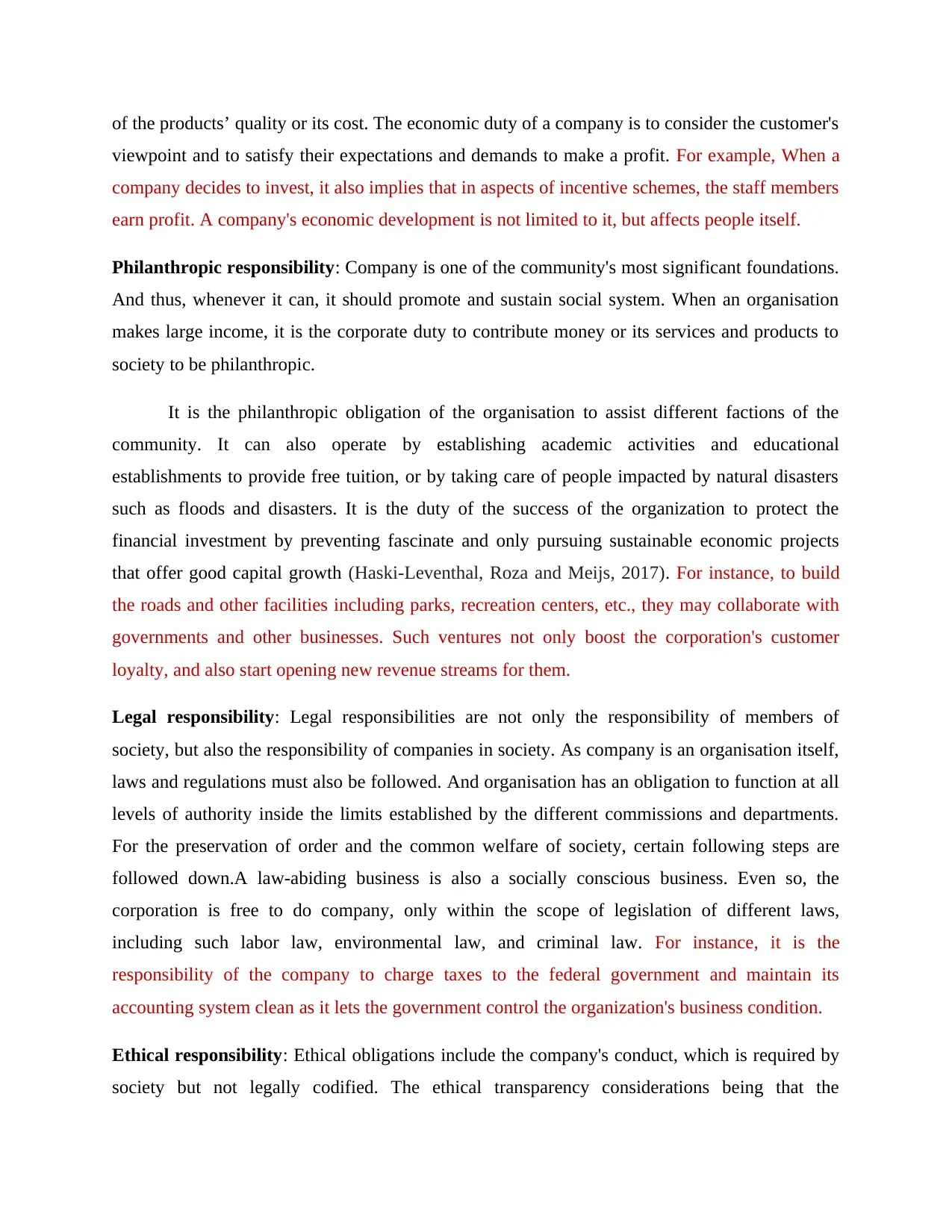
of the products’ quality or its cost. The economic duty of a company is to consider the customer's
viewpoint and to satisfy their expectations and demands to make a profit. For example, When a
company decides to invest, it also implies that in aspects of incentive schemes, the staff members
earn profit. A company's economic development is not limited to it, but affects people itself.
Philanthropic responsibility: Company is one of the community's most significant foundations.
And thus, whenever it can, it should promote and sustain social system. When an organisation
makes large income, it is the corporate duty to contribute money or its services and products to
society to be philanthropic.
It is the philanthropic obligation of the organisation to assist different factions of the
community. It can also operate by establishing academic activities and educational
establishments to provide free tuition, or by taking care of people impacted by natural disasters
such as floods and disasters. It is the duty of the success of the organization to protect the
financial investment by preventing fascinate and only pursuing sustainable economic projects
that offer good capital growth (Haski-Leventhal, Roza and Meijs, 2017). For instance, to build
the roads and other facilities including parks, recreation centers, etc., they may collaborate with
governments and other businesses. Such ventures not only boost the corporation's customer
loyalty, and also start opening new revenue streams for them.
Legal responsibility: Legal responsibilities are not only the responsibility of members of
society, but also the responsibility of companies in society. As company is an organisation itself,
laws and regulations must also be followed. And organisation has an obligation to function at all
levels of authority inside the limits established by the different commissions and departments.
For the preservation of order and the common welfare of society, certain following steps are
followed down.A law-abiding business is also a socially conscious business. Even so, the
corporation is free to do company, only within the scope of legislation of different laws,
including such labor law, environmental law, and criminal law. For instance, it is the
responsibility of the company to charge taxes to the federal government and maintain its
accounting system clean as it lets the government control the organization's business condition.
Ethical responsibility: Ethical obligations include the company's conduct, which is required by
society but not legally codified. The ethical transparency considerations being that the
viewpoint and to satisfy their expectations and demands to make a profit. For example, When a
company decides to invest, it also implies that in aspects of incentive schemes, the staff members
earn profit. A company's economic development is not limited to it, but affects people itself.
Philanthropic responsibility: Company is one of the community's most significant foundations.
And thus, whenever it can, it should promote and sustain social system. When an organisation
makes large income, it is the corporate duty to contribute money or its services and products to
society to be philanthropic.
It is the philanthropic obligation of the organisation to assist different factions of the
community. It can also operate by establishing academic activities and educational
establishments to provide free tuition, or by taking care of people impacted by natural disasters
such as floods and disasters. It is the duty of the success of the organization to protect the
financial investment by preventing fascinate and only pursuing sustainable economic projects
that offer good capital growth (Haski-Leventhal, Roza and Meijs, 2017). For instance, to build
the roads and other facilities including parks, recreation centers, etc., they may collaborate with
governments and other businesses. Such ventures not only boost the corporation's customer
loyalty, and also start opening new revenue streams for them.
Legal responsibility: Legal responsibilities are not only the responsibility of members of
society, but also the responsibility of companies in society. As company is an organisation itself,
laws and regulations must also be followed. And organisation has an obligation to function at all
levels of authority inside the limits established by the different commissions and departments.
For the preservation of order and the common welfare of society, certain following steps are
followed down.A law-abiding business is also a socially conscious business. Even so, the
corporation is free to do company, only within the scope of legislation of different laws,
including such labor law, environmental law, and criminal law. For instance, it is the
responsibility of the company to charge taxes to the federal government and maintain its
accounting system clean as it lets the government control the organization's business condition.
Ethical responsibility: Ethical obligations include the company's conduct, which is required by
society but not legally codified. The ethical transparency considerations being that the
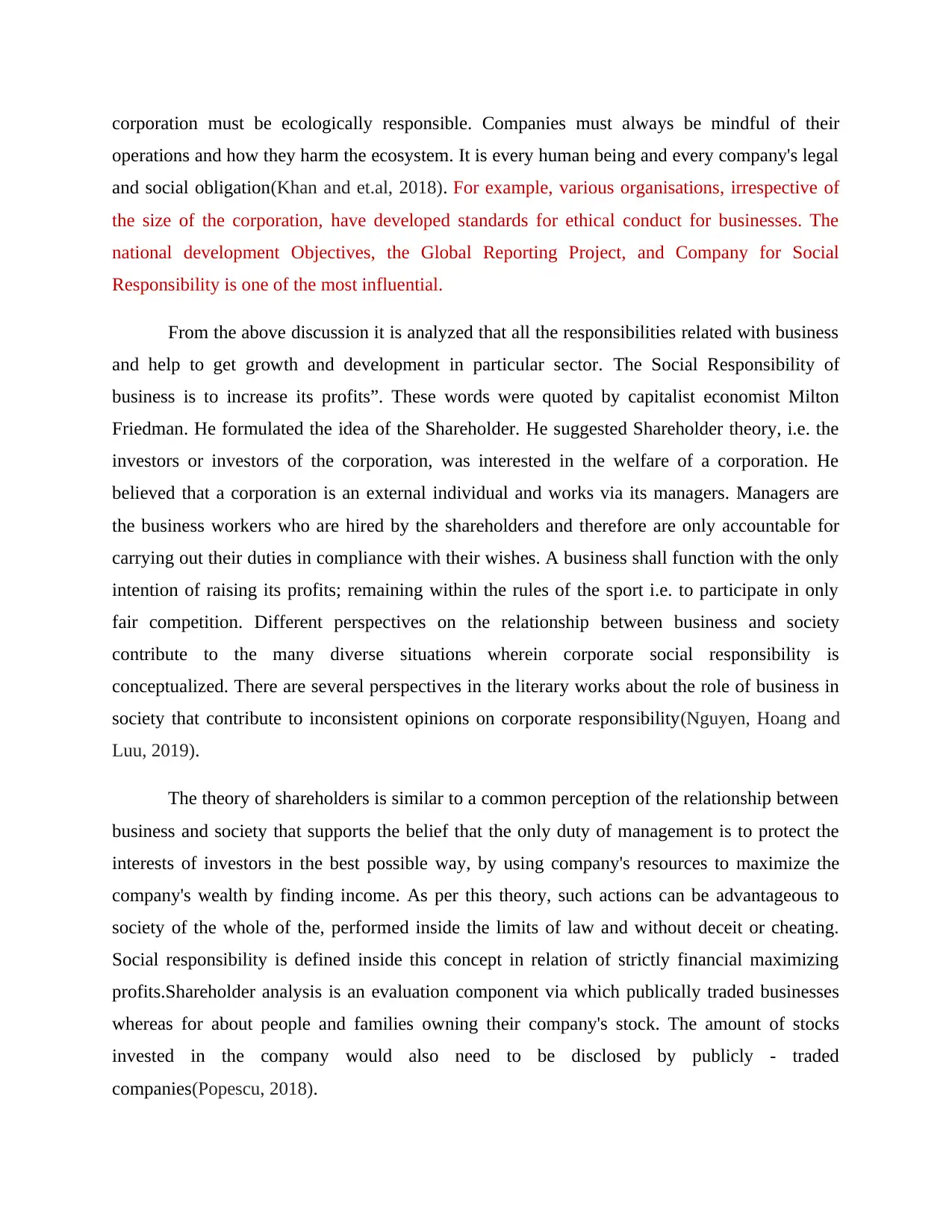
corporation must be ecologically responsible. Companies must always be mindful of their
operations and how they harm the ecosystem. It is every human being and every company's legal
and social obligation(Khan and et.al, 2018). For example, various organisations, irrespective of
the size of the corporation, have developed standards for ethical conduct for businesses. The
national development Objectives, the Global Reporting Project, and Company for Social
Responsibility is one of the most influential.
From the above discussion it is analyzed that all the responsibilities related with business
and help to get growth and development in particular sector. The Social Responsibility of
business is to increase its profits”. These words were quoted by capitalist economist Milton
Friedman. He formulated the idea of the Shareholder. He suggested Shareholder theory, i.e. the
investors or investors of the corporation, was interested in the welfare of a corporation. He
believed that a corporation is an external individual and works via its managers. Managers are
the business workers who are hired by the shareholders and therefore are only accountable for
carrying out their duties in compliance with their wishes. A business shall function with the only
intention of raising its profits; remaining within the rules of the sport i.e. to participate in only
fair competition. Different perspectives on the relationship between business and society
contribute to the many diverse situations wherein corporate social responsibility is
conceptualized. There are several perspectives in the literary works about the role of business in
society that contribute to inconsistent opinions on corporate responsibility(Nguyen, Hoang and
Luu, 2019).
The theory of shareholders is similar to a common perception of the relationship between
business and society that supports the belief that the only duty of management is to protect the
interests of investors in the best possible way, by using company's resources to maximize the
company's wealth by finding income. As per this theory, such actions can be advantageous to
society of the whole of the, performed inside the limits of law and without deceit or cheating.
Social responsibility is defined inside this concept in relation of strictly financial maximizing
profits.Shareholder analysis is an evaluation component via which publically traded businesses
whereas for about people and families owning their company's stock. The amount of stocks
invested in the company would also need to be disclosed by publicly - traded
companies(Popescu, 2018).
operations and how they harm the ecosystem. It is every human being and every company's legal
and social obligation(Khan and et.al, 2018). For example, various organisations, irrespective of
the size of the corporation, have developed standards for ethical conduct for businesses. The
national development Objectives, the Global Reporting Project, and Company for Social
Responsibility is one of the most influential.
From the above discussion it is analyzed that all the responsibilities related with business
and help to get growth and development in particular sector. The Social Responsibility of
business is to increase its profits”. These words were quoted by capitalist economist Milton
Friedman. He formulated the idea of the Shareholder. He suggested Shareholder theory, i.e. the
investors or investors of the corporation, was interested in the welfare of a corporation. He
believed that a corporation is an external individual and works via its managers. Managers are
the business workers who are hired by the shareholders and therefore are only accountable for
carrying out their duties in compliance with their wishes. A business shall function with the only
intention of raising its profits; remaining within the rules of the sport i.e. to participate in only
fair competition. Different perspectives on the relationship between business and society
contribute to the many diverse situations wherein corporate social responsibility is
conceptualized. There are several perspectives in the literary works about the role of business in
society that contribute to inconsistent opinions on corporate responsibility(Nguyen, Hoang and
Luu, 2019).
The theory of shareholders is similar to a common perception of the relationship between
business and society that supports the belief that the only duty of management is to protect the
interests of investors in the best possible way, by using company's resources to maximize the
company's wealth by finding income. As per this theory, such actions can be advantageous to
society of the whole of the, performed inside the limits of law and without deceit or cheating.
Social responsibility is defined inside this concept in relation of strictly financial maximizing
profits.Shareholder analysis is an evaluation component via which publically traded businesses
whereas for about people and families owning their company's stock. The amount of stocks
invested in the company would also need to be disclosed by publicly - traded
companies(Popescu, 2018).
⊘ This is a preview!⊘
Do you want full access?
Subscribe today to unlock all pages.

Trusted by 1+ million students worldwide
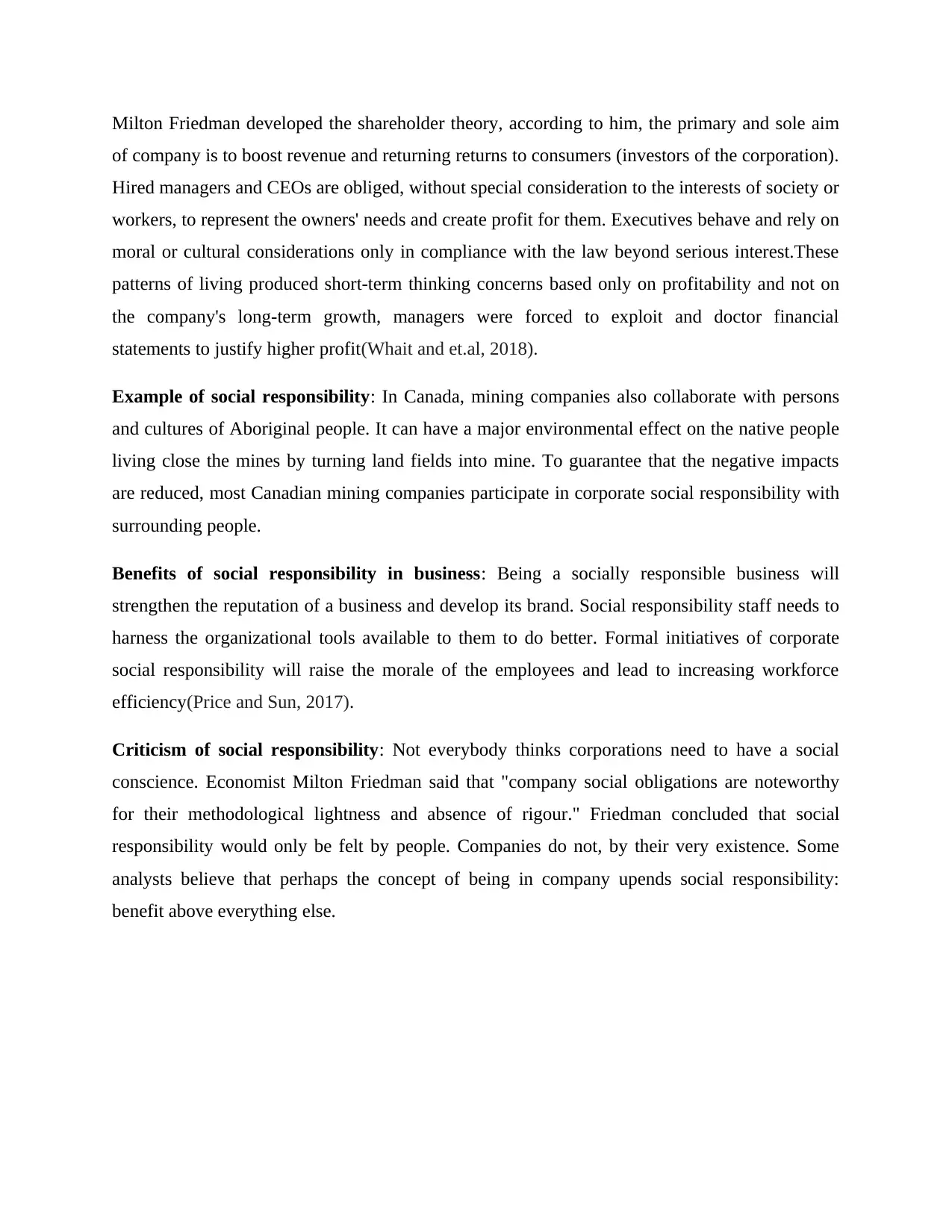
Milton Friedman developed the shareholder theory, according to him, the primary and sole aim
of company is to boost revenue and returning returns to consumers (investors of the corporation).
Hired managers and CEOs are obliged, without special consideration to the interests of society or
workers, to represent the owners' needs and create profit for them. Executives behave and rely on
moral or cultural considerations only in compliance with the law beyond serious interest.These
patterns of living produced short-term thinking concerns based only on profitability and not on
the company's long-term growth, managers were forced to exploit and doctor financial
statements to justify higher profit(Whait and et.al, 2018).
Example of social responsibility: In Canada, mining companies also collaborate with persons
and cultures of Aboriginal people. It can have a major environmental effect on the native people
living close the mines by turning land fields into mine. To guarantee that the negative impacts
are reduced, most Canadian mining companies participate in corporate social responsibility with
surrounding people.
Benefits of social responsibility in business: Being a socially responsible business will
strengthen the reputation of a business and develop its brand. Social responsibility staff needs to
harness the organizational tools available to them to do better. Formal initiatives of corporate
social responsibility will raise the morale of the employees and lead to increasing workforce
efficiency(Price and Sun, 2017).
Criticism of social responsibility: Not everybody thinks corporations need to have a social
conscience. Economist Milton Friedman said that "company social obligations are noteworthy
for their methodological lightness and absence of rigour." Friedman concluded that social
responsibility would only be felt by people. Companies do not, by their very existence. Some
analysts believe that perhaps the concept of being in company upends social responsibility:
benefit above everything else.
of company is to boost revenue and returning returns to consumers (investors of the corporation).
Hired managers and CEOs are obliged, without special consideration to the interests of society or
workers, to represent the owners' needs and create profit for them. Executives behave and rely on
moral or cultural considerations only in compliance with the law beyond serious interest.These
patterns of living produced short-term thinking concerns based only on profitability and not on
the company's long-term growth, managers were forced to exploit and doctor financial
statements to justify higher profit(Whait and et.al, 2018).
Example of social responsibility: In Canada, mining companies also collaborate with persons
and cultures of Aboriginal people. It can have a major environmental effect on the native people
living close the mines by turning land fields into mine. To guarantee that the negative impacts
are reduced, most Canadian mining companies participate in corporate social responsibility with
surrounding people.
Benefits of social responsibility in business: Being a socially responsible business will
strengthen the reputation of a business and develop its brand. Social responsibility staff needs to
harness the organizational tools available to them to do better. Formal initiatives of corporate
social responsibility will raise the morale of the employees and lead to increasing workforce
efficiency(Price and Sun, 2017).
Criticism of social responsibility: Not everybody thinks corporations need to have a social
conscience. Economist Milton Friedman said that "company social obligations are noteworthy
for their methodological lightness and absence of rigour." Friedman concluded that social
responsibility would only be felt by people. Companies do not, by their very existence. Some
analysts believe that perhaps the concept of being in company upends social responsibility:
benefit above everything else.
Paraphrase This Document
Need a fresh take? Get an instant paraphrase of this document with our AI Paraphraser
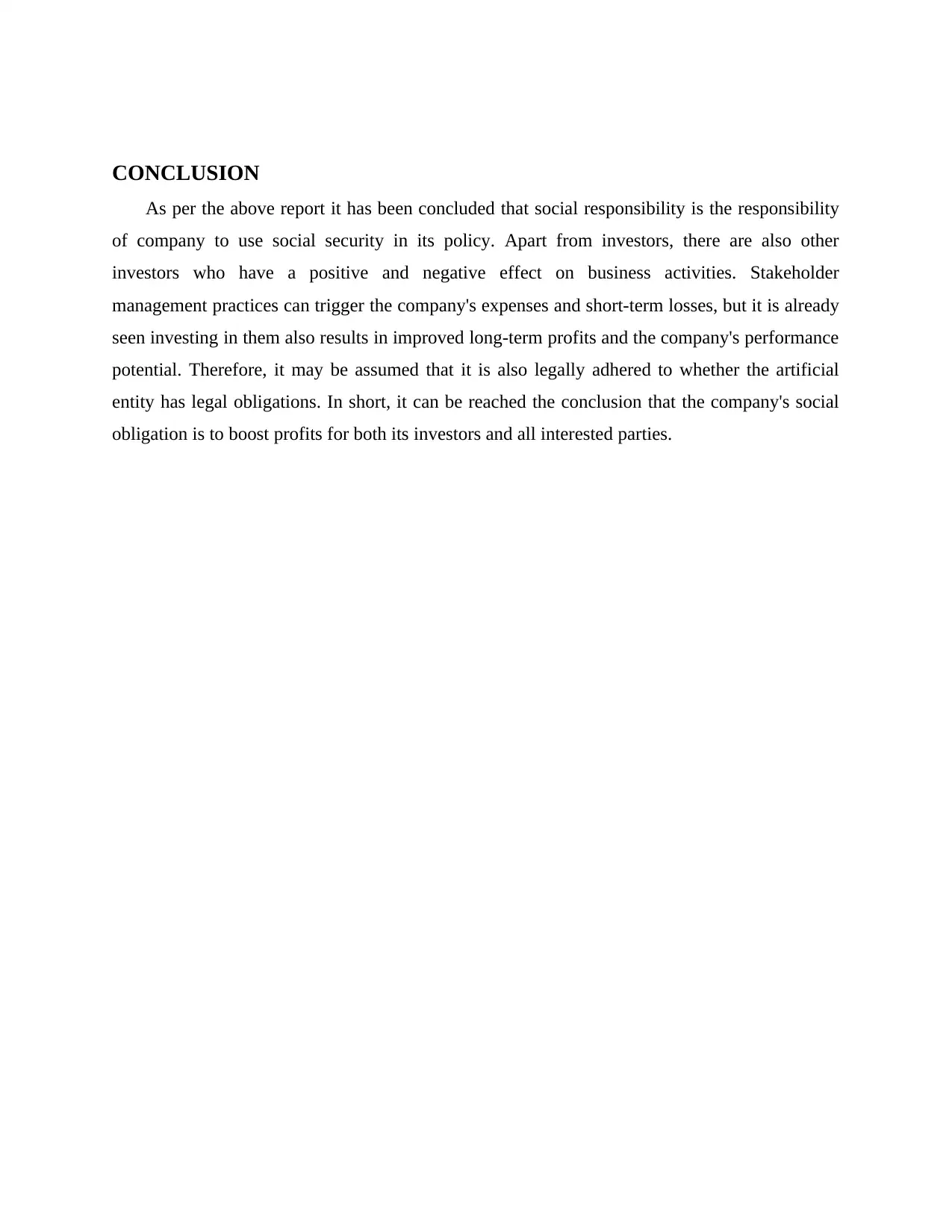
CONCLUSION
As per the above report it has been concluded that social responsibility is the responsibility
of company to use social security in its policy. Apart from investors, there are also other
investors who have a positive and negative effect on business activities. Stakeholder
management practices can trigger the company's expenses and short-term losses, but it is already
seen investing in them also results in improved long-term profits and the company's performance
potential. Therefore, it may be assumed that it is also legally adhered to whether the artificial
entity has legal obligations. In short, it can be reached the conclusion that the company's social
obligation is to boost profits for both its investors and all interested parties.
As per the above report it has been concluded that social responsibility is the responsibility
of company to use social security in its policy. Apart from investors, there are also other
investors who have a positive and negative effect on business activities. Stakeholder
management practices can trigger the company's expenses and short-term losses, but it is already
seen investing in them also results in improved long-term profits and the company's performance
potential. Therefore, it may be assumed that it is also legally adhered to whether the artificial
entity has legal obligations. In short, it can be reached the conclusion that the company's social
obligation is to boost profits for both its investors and all interested parties.
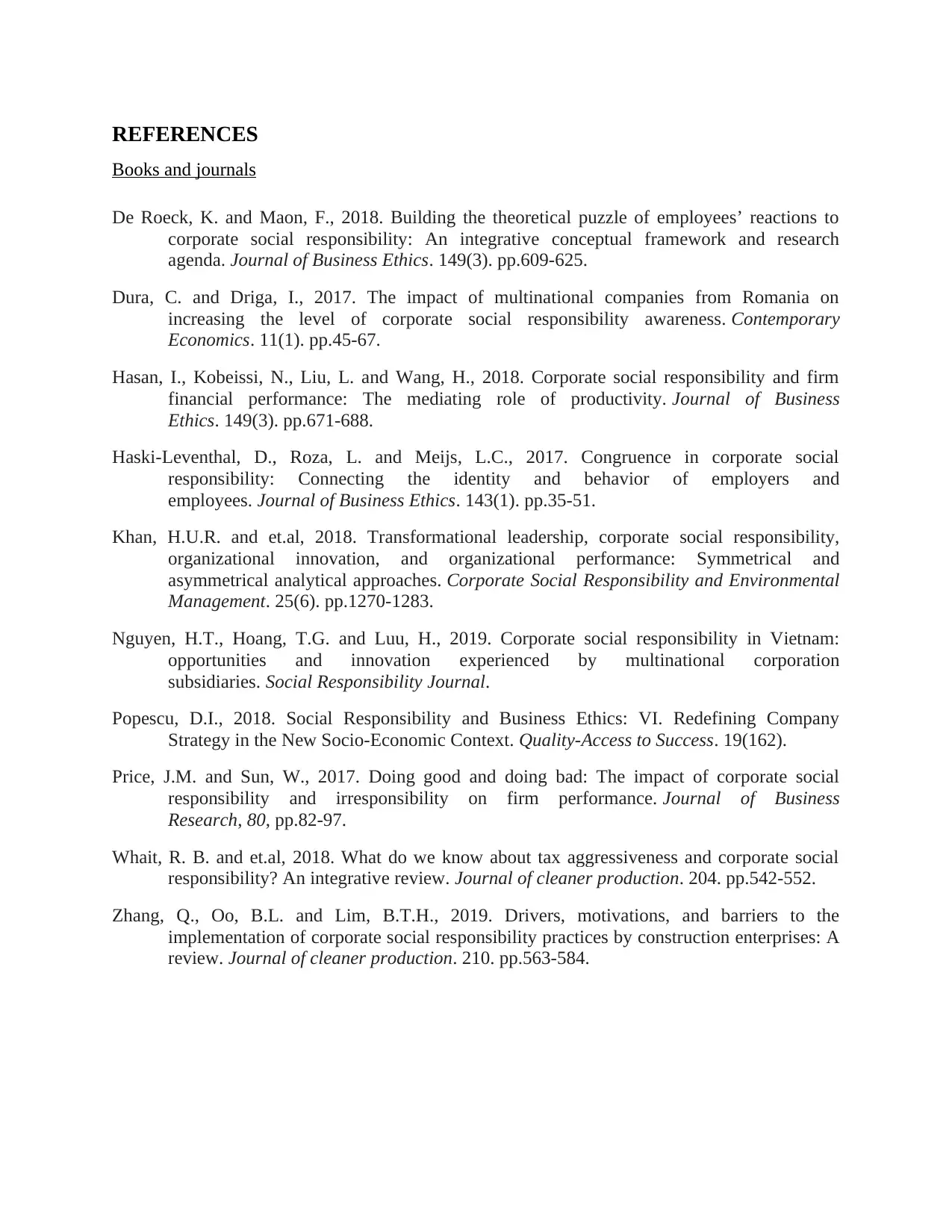
REFERENCES
Books and journals
De Roeck, K. and Maon, F., 2018. Building the theoretical puzzle of employees’ reactions to
corporate social responsibility: An integrative conceptual framework and research
agenda. Journal of Business Ethics. 149(3). pp.609-625.
Dura, C. and Driga, I., 2017. The impact of multinational companies from Romania on
increasing the level of corporate social responsibility awareness. Contemporary
Economics. 11(1). pp.45-67.
Hasan, I., Kobeissi, N., Liu, L. and Wang, H., 2018. Corporate social responsibility and firm
financial performance: The mediating role of productivity. Journal of Business
Ethics. 149(3). pp.671-688.
Haski-Leventhal, D., Roza, L. and Meijs, L.C., 2017. Congruence in corporate social
responsibility: Connecting the identity and behavior of employers and
employees. Journal of Business Ethics. 143(1). pp.35-51.
Khan, H.U.R. and et.al, 2018. Transformational leadership, corporate social responsibility,
organizational innovation, and organizational performance: Symmetrical and
asymmetrical analytical approaches. Corporate Social Responsibility and Environmental
Management. 25(6). pp.1270-1283.
Nguyen, H.T., Hoang, T.G. and Luu, H., 2019. Corporate social responsibility in Vietnam:
opportunities and innovation experienced by multinational corporation
subsidiaries. Social Responsibility Journal.
Popescu, D.I., 2018. Social Responsibility and Business Ethics: VI. Redefining Company
Strategy in the New Socio-Economic Context. Quality-Access to Success. 19(162).
Price, J.M. and Sun, W., 2017. Doing good and doing bad: The impact of corporate social
responsibility and irresponsibility on firm performance. Journal of Business
Research, 80, pp.82-97.
Whait, R. B. and et.al, 2018. What do we know about tax aggressiveness and corporate social
responsibility? An integrative review. Journal of cleaner production. 204. pp.542-552.
Zhang, Q., Oo, B.L. and Lim, B.T.H., 2019. Drivers, motivations, and barriers to the
implementation of corporate social responsibility practices by construction enterprises: A
review. Journal of cleaner production. 210. pp.563-584.
Books and journals
De Roeck, K. and Maon, F., 2018. Building the theoretical puzzle of employees’ reactions to
corporate social responsibility: An integrative conceptual framework and research
agenda. Journal of Business Ethics. 149(3). pp.609-625.
Dura, C. and Driga, I., 2017. The impact of multinational companies from Romania on
increasing the level of corporate social responsibility awareness. Contemporary
Economics. 11(1). pp.45-67.
Hasan, I., Kobeissi, N., Liu, L. and Wang, H., 2018. Corporate social responsibility and firm
financial performance: The mediating role of productivity. Journal of Business
Ethics. 149(3). pp.671-688.
Haski-Leventhal, D., Roza, L. and Meijs, L.C., 2017. Congruence in corporate social
responsibility: Connecting the identity and behavior of employers and
employees. Journal of Business Ethics. 143(1). pp.35-51.
Khan, H.U.R. and et.al, 2018. Transformational leadership, corporate social responsibility,
organizational innovation, and organizational performance: Symmetrical and
asymmetrical analytical approaches. Corporate Social Responsibility and Environmental
Management. 25(6). pp.1270-1283.
Nguyen, H.T., Hoang, T.G. and Luu, H., 2019. Corporate social responsibility in Vietnam:
opportunities and innovation experienced by multinational corporation
subsidiaries. Social Responsibility Journal.
Popescu, D.I., 2018. Social Responsibility and Business Ethics: VI. Redefining Company
Strategy in the New Socio-Economic Context. Quality-Access to Success. 19(162).
Price, J.M. and Sun, W., 2017. Doing good and doing bad: The impact of corporate social
responsibility and irresponsibility on firm performance. Journal of Business
Research, 80, pp.82-97.
Whait, R. B. and et.al, 2018. What do we know about tax aggressiveness and corporate social
responsibility? An integrative review. Journal of cleaner production. 204. pp.542-552.
Zhang, Q., Oo, B.L. and Lim, B.T.H., 2019. Drivers, motivations, and barriers to the
implementation of corporate social responsibility practices by construction enterprises: A
review. Journal of cleaner production. 210. pp.563-584.
⊘ This is a preview!⊘
Do you want full access?
Subscribe today to unlock all pages.

Trusted by 1+ million students worldwide
1 out of 9
Related Documents
Your All-in-One AI-Powered Toolkit for Academic Success.
+13062052269
info@desklib.com
Available 24*7 on WhatsApp / Email
![[object Object]](/_next/static/media/star-bottom.7253800d.svg)
Unlock your academic potential
Copyright © 2020–2026 A2Z Services. All Rights Reserved. Developed and managed by ZUCOL.





